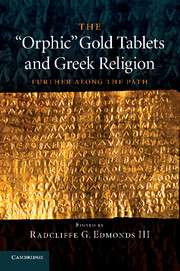Book contents
- Frontmatter
- Contents
- List of contributors
- Acknowledgements
- Note on abberivations
- PART I THE TABLET TEXTS
- PART II TEXTS AND CONTEXTS
- PART III SEMIOTIC AND NARRATIVE ANALYSES
- 8 Funerary gold lamellae and Orphic papyrus commentaries
- 9 Initiation – death – underworld
- 10 Sacred scripture or oracles for the dead?
- 11 Dialogues of immortality from the Iliad to the gold leaves
- 12 Poetry and performance in the Orphic gold leaves
- 13 Rushing into milk
- Compiled Bibliography
- Index
- Index locorum
10 - Sacred scripture or oracles for the dead?
The semiotic situation of the “Orphic” gold tablets
Published online by Cambridge University Press: 04 February 2011
- Frontmatter
- Contents
- List of contributors
- Acknowledgements
- Note on abberivations
- PART I THE TABLET TEXTS
- PART II TEXTS AND CONTEXTS
- PART III SEMIOTIC AND NARRATIVE ANALYSES
- 8 Funerary gold lamellae and Orphic papyrus commentaries
- 9 Initiation – death – underworld
- 10 Sacred scripture or oracles for the dead?
- 11 Dialogues of immortality from the Iliad to the gold leaves
- 12 Poetry and performance in the Orphic gold leaves
- 13 Rushing into milk
- Compiled Bibliography
- Index
- Index locorum
Summary
Orphism did not exist for the ancient Greeks. Even Bianchi, who argued for the opposite conclusion, admitted that a term like “Orphism” must refer to a modern scholarly construct, a category by which we classify certain phenomena of the ancient world. Like any “ism,” therefore, Orphism would have to be a religious phenomenon comprised of the beliefs and practices, texts and artifacts, individuals and social organizations that were, by some definition or other, “Orphic.”
Problems arise, however, because not only modern scholars but also the ancient Greeks themselves labeled certain things as “Orphic,” and, as is the case with the term “magic,” the ancient, primary category is not precisely the same as the modern, secondary one. Not only did some ancient authors choose Orpheus as an authoritative pseudonym for their own compositions, but other ancient commentators also labeled certain texts, ideas, rites and so forth as Orphic, either for praise or for blame. As Linforth showed over sixty years ago, if we take merely those things explicitly sealed by the ancients with the name of Orpheus or the adjective Orphic, we cannot reconstruct a coherent religious movement founded upon specific central doctrines, manifested in particular social organizations, or engaged in activities peculiar to its members. In the years since Linforth, however, scholars have objected that, if we abandon the idea of Orphism as a coherent religious movement, we have no other alternative for a coherent religious movement that would explain the evidence.
- Type
- Chapter
- Information
- The 'Orphic' Gold Tablets and Greek ReligionFurther along the Path, pp. 257 - 270Publisher: Cambridge University PressPrint publication year: 2011
- 2
- Cited by



